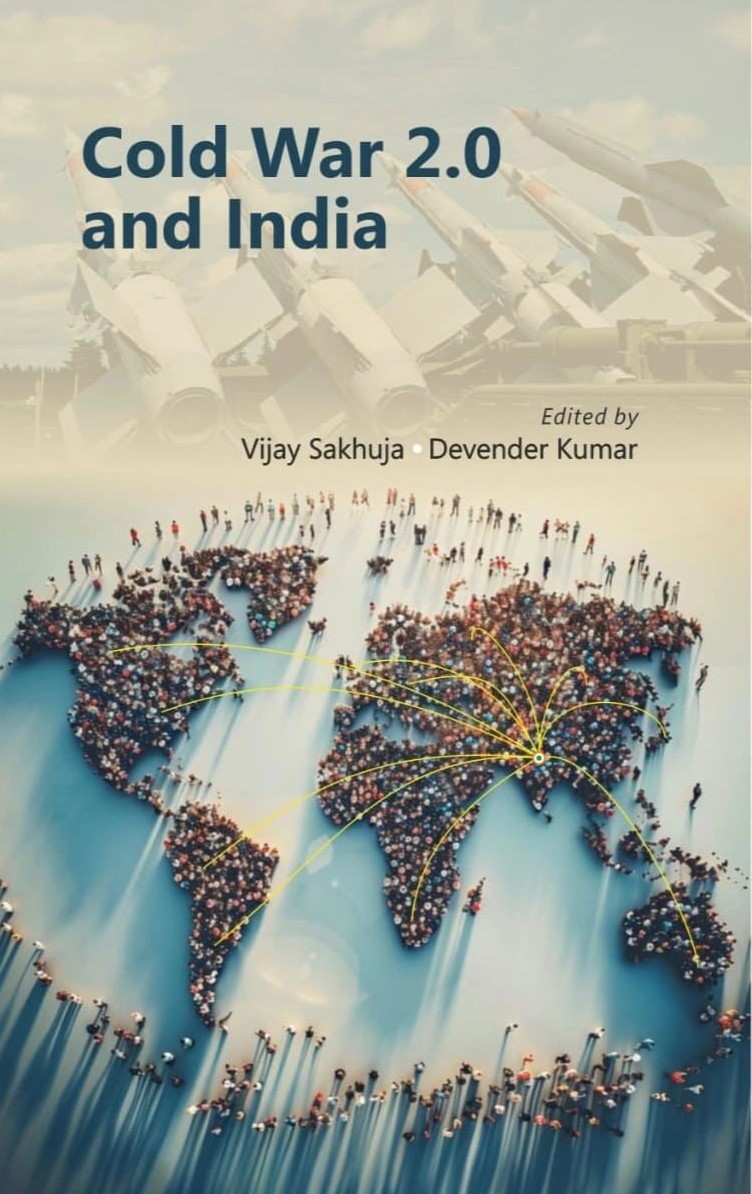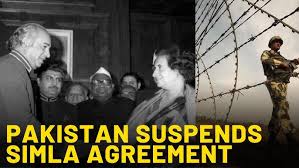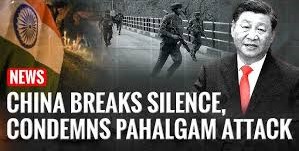My contribution to the book
“Cold War 2.0 and India”
The world is witnessing the emergence of a new Cold War, often referred to as Cold War 2.0, primarily driven by intensifying geopolitical, economic, and technological rivalries between the United States and China, with Russia playing a significant role. Unlike the ideological battle of the original Cold War, this modern conflict is fuelled by strategic competition for global influence, military dominance, and economic control. Key drivers of Cold War 2.0 include China’s rise as a military and technological superpower, the US-led effort to counterbalance Beijing’s influence, and Russia’s challenge to Western dominance. Arms build-ups, strategic alliances, hybrid warfare, and advancements in emerging technologies like artificial intelligence, space warfare, and hypersonic missiles mainly characterise Cold War 2.0. For India, this renewed great-power rivalry presents both opportunities and challenges. Understanding the military dimensions of Cold War 2.0 is crucial and necessary for analysing its impact on global stability, the evolving nature of warfare, and the strategic recalibrations required for nations like India to safeguard their security interests.
Drivers of Cold War 2.0
The re-emergence of great power competition in the 21st century has led to a period characterised by heightened strategic rivalry between the United States and China, with Russia playing a significant but secondary role. Unlike the original Cold War, which was primarily an ideological struggle between capitalism and communism, this new iteration is driven by geopolitical, economic, technological, and military factors. These factors have reshaped the global order and fuelled an environment of sustained strategic hostility, making Cold War 2.0 a defining feature of contemporary international relations.
One of the most significant drivers of Cold War 2.0 is the rise of China as a global superpower, challenging the longstanding dominance of the United States. Over the past four decades, China has undergone an economic and military transformation that has propelled it to the forefront of global politics. The Belt and Road Initiative (BRI), China’s massive infrastructure and investment project spanning Asia, Africa, and Europe, has been a key instrument in expanding Beijing’s influence. While China claims that the BRI is purely an economic initiative, Western policymakers see it as a geopolitical tool to increase China’s leverage over developing nations. Furthermore, China’s military expansion, most notably in the South China Sea, has alarmed the United States and its regional allies. The Chinese Communist Party (CCP) has also aggressively pursued technological dominance, particularly in fields such as artificial intelligence, 5G, and quantum computing. The rapid ascendance of China as a comprehensive power has disrupted the global balance, triggering countermeasures from the United States, including trade restrictions, sanctions on Chinese technology firms, and strengthened military alliances in the Indo-Pacific. This great power rivalry, rooted in China’s challenge to U.S. hegemony, is a fundamental driver of Cold War 2.0.
The second major driver of this new Cold War is the resurgence of Russia as a revisionist state seeking to undermine Western influence and reassert its geopolitical ambitions. Although Russia lacks comparative economic power, it remains a formidable military force with vast energy resources and a willingness to engage in aggressive foreign policies. The war in Ukraine has strengthened the perception of a new Cold War, with Russia aligning itself more closely with China, Iran, and North Korea to counterbalance Western power. Russia’s actions have not only escalated tensions with the United States and Europe but have also contributed to a broader global realignment, with countries being forced to take sides in this emerging bipolar struggle.
The erosion of American unipolarity and the fragmentation of the liberal international order have also played a crucial role in driving Cold War 2.0. Following the collapse of the Soviet Union in 1991, the United States emerged as the world’s sole superpower, ushering in a period of unchallenged American dominance. However, U.S. global influence has waned in recent years due to domestic political polarisation, costly military interventions, and economic challenges. The wars in Iraq and Afghanistan drained American resources. They damaged its credibility, while the rise of populist movements and political divisions have weakened Washington’s ability to project unified global leadership. The decline of unipolarity has created a more competitive and unstable international system, where power is increasingly distributed among multiple actors, setting the stage for heightened strategic rivalry.
Economic decoupling and technological competition between the United States and China constitute another major driver of Cold War 2.0. The global economy, once characterised by deep interdependence, is now experiencing a shift toward fragmentation as Washington and Beijing seek to reduce their reliance on each other. The U.S. has imposed sweeping restrictions on Chinese technology firms, particularly in semiconductor manufacturing, artificial intelligence, and telecommunications, citing national security concerns. In response, China has accelerated its efforts to achieve self-sufficiency in critical industries, investing heavily in indigenous innovation and supply chain resilience. This technological decoupling is not just an economic issue—it has profound military and strategic implications, as control over emerging technologies will determine the balance of power in future conflicts. The race for supremacy in AI, quantum computing, cyber warfare, and space exploration is now a central battlefield in Cold War 2.0, with both sides striving to outmanoeuvre each other in the next frontier of global dominance.
Finally, the ideological and political divide between democratic and authoritarian systems has reinforced the divisions of Cold War 2.0. The United States and its allies promote liberal democracy, human rights, and a rules-based international order. Meanwhile, China and Russia advocate for state sovereignty, authoritarian stability, and non-interference in domestic affairs. The contrast between these governance models has led to intensified ideological competition, with both sides seeking to expand their influence globally. The U.S. has framed its rivalry with China and Russia as a struggle between democracy and autocracy, rallying allies to counter Beijing’s and Moscow’s influence in international institutions. Meanwhile, China’s “Global Security Initiative” aim to portray the West as a declining power, promoting an alternative world order.
Military Aspects of Cold War 2.0
The evolving geopolitical landscape of the 21st century has increasingly drawn comparisons to the original Cold War. The military dimension of Cold War 2.0 is particularly critical, as it shapes global security dynamics through arms races, power projection, strategic alliances, and hybrid warfare. The military aspect of this renewed competition manifests in several key areas.
One of the most visible military aspects of Cold War 2.0 is the modernisation and expansion of nuclear arsenals. While the U.S. and Russia still maintain the largest stockpiles of nuclear weapons, China’s rapid nuclear build-up has become a central concern for Western policymakers. Unlike during the first Cold War, when the U.S. and Soviet Union were the primary nuclear superpowers, the emergence of China as a third major nuclear player significantly altered the strategic calculus. Beijing has also been expanding its missile silos, developing hypersonic delivery systems, and pursuing advanced nuclear-powered submarines, signalling its intent to establish a more robust second-strike capability. At the same time, Russia’s suspension of the New START treaty, coupled with its threats of tactical nuclear weapon use in Ukraine, has reignited fears of a new nuclear arms race. The U.S., in response, is modernising its nuclear triad, investing heavily in next-generation intercontinental ballistic missiles (ICBMs), stealth bombers, and submarine-launched ballistic missiles. These developments indicate that nuclear deterrence strategies are again at the forefront of great power competition.
Beyond nuclear weapons, conventional military capabilities have also been undergoing significant transformation. The trend is towards increased investment in stealth aircraft, long-range precision strike systems, autonomous combat platforms, and integrated air and missile defence networks. For its part, China has undertaken one of the most extensive military modernisation programs in history. The People’s Liberation Army (PLA) has rapidly expanded its naval and air forces. Despite economic constraints, Russia has focused on asymmetric warfare strategies, leveraging advanced air defence systems, hypersonic missiles, and electronic warfare capabilities.
A defining feature of Cold War 2.0 is the race for military superiority in emerging technologies such as artificial intelligence (AI), quantum computing, and autonomous warfare. Unlike the first Cold War, where military advancements were primarily centred on nuclear and conventional weaponry, digital and cyber capabilities are expected to shape modern conflicts. AI-driven autonomous drones, robotic combat units, and cyber warfare tools have become central to military planning. Quantum computing, if fully realised, could render current encryption methods obsolete, drastically altering cyber defence strategies. The cyber domain has emerged as a battlefield, with state-sponsored cyber attacks targeting critical infrastructure, defence networks, and economic systems. As nations develop offensive and defensive cyber capabilities, the risk of cyber escalation and strategic instability increases significantly.
Hybrid warfare, a strategy that blends conventional military tactics with cyber, economic, and information warfare, has also become a defining characteristic of Cold War 2.0. China employs hybrid tactics involving disinformation campaigns, cyber-attacks, and proxy militias, leveraging economic coercion, political influence operations, and grey-zone warfare. The U.S. and its allies have responded with countermeasures, including economic sanctions, cyber counteroffensives, and the strengthening of information warfare capabilities. Unlike the Cold War of the 20th century, where direct military confrontations were largely avoided, the modern iteration features a greater degree of low intensity. These asymmetric conflicts blur the line between war and peace.
Impact of Cold War 2.0 on Indian Security
The emergence of a second Cold War has profound implications for India’s security. One of the most immediate effects of Cold War 2.0 on India is the increased militarisation of the Indo-Pacific region. As the United States seeks to contain China’s growing military and economic influence, it has strengthened its ties with allies and partners. This has enhanced defence cooperation, intelligence sharing, and joint military exercises. It has drawn India into the broader US-China confrontation, making it a target for Chinese actions, such as aggressive border moves, cyber warfare, and economic coercion. The 2020 Galwan Valley clash between Indian and Chinese forces was a stark reminder of how geopolitical tensions manifest as direct security threats for India.
Another major concern is the growing China-Pakistan nexus, which has intensified in response to Cold War 2.0. China has significantly increased its defence, economic, and nuclear cooperation with Pakistan, which directly impacts India’s security. The China-Pakistan Economic Corridor (CPEC), a flagship project of Beijing’s Belt and Road Initiative (BRI), runs through Pakistan-occupied Kashmir (PoK), challenging India’s territorial claims. China’s supply of advanced military hardware, including fighter jets, submarines, and missile systems, has strengthened Pakistan’s military capabilities, altering South Asia’s conventional and nuclear balance. There are also concerns that China could use Pakistan as a proxy to destabilise India.
India’s maritime security has also been affected as Cold War 2.0 extends into the Indian Ocean Region (IOR). China has expanded its naval footprint through bases in Djibouti and potential dual-use facilities in Sri Lanka, Pakistan (Gwadar), and Myanmar. The People’s Liberation Army Navy (PLAN) has increased its submarine patrols and surveillance activities near India’s maritime boundaries, challenging India’s dominance in its strategic backyard.
Technological competition in Cold War 2.0 also affects India’s security, particularly in artificial intelligence (AI), cyber security, and space warfare. The US and China are engaged in a technological arms race, and India must navigate this landscape carefully. Increased focus on Indigenous defence production under “Atmanirbhar Bharat” (self-reliant India) is a direct consequence of this competition.
Diplomatically, Cold War 2.0 presents India with both challenges and opportunities. While the US-India partnership has grown stronger, India remains cautious about being seen as a mere US ally. India has historically valued its strategic autonomy, as seen in its continued engagement with Russia despite Western pressure. India relies on Russian military hardware, including S-400 missile systems, and has resisted aligning too closely with US-led security pacts. However, this balancing act is becoming increasingly difficult as Cold War 2.0 escalates, forcing India to make difficult choices.
Economically, Cold War 2.0 presents risks for India’s trade and supply chain security. The US-China decoupling has disrupted global trade, affecting India’s access to key technologies, raw materials, and markets. The push for friend-shoring and near-shoring has led companies to diversify supply chains, offering India an opportunity to attract investments as an alternative manufacturing hub. However, China remains one of India’s largest trading partners, and an outright economic confrontation would be costly. India must, therefore, navigate a complex economic environment, securing its interests without alienating key partners.
Conclusion
Cold War 2.0 has fundamentally reshaped the global security landscape, with military competition emerging as a key aspect of great-power rivalry. Driven by China’s rise, Russia’s resurgence, and the United States’ efforts to maintain its strategic dominance, this new geopolitical contest is marked by military build-ups, shifting alliances, and technological arms races. The military developments have made the world more unstable, with regional conflicts and proxy wars serving as potential flashpoints for broader confrontations. For India, Cold War 2.0 presents both security threats and strategic opportunities. The growing China-Pakistan nexus and Beijing’s assertiveness along the Line of Actual Control (LAC) pose direct military challenges to India. The militarisation of the Indian Ocean, the threat of cyber warfare, and disruptions to global supply chains further complicate India’s security environment. To navigate this evolving conflict, India must bolster its military capabilities, strengthen regional partnerships, and maintain its strategic autonomy to avoid outright confrontation. As Cold War 2.0 continues to unfold, the global military balance will be shaped by how nations adapt to this new era of great-power competition, making it essential for India to proactively safeguard its national security while leveraging opportunities to enhance its geopolitical standing.
Please Add Value to the write-up with your views on the subject.
For regular updates, please register your email here:-
References and credits
To all the online sites and channels.
Pics Courtesy: Internet
Disclaimer:
Information and data included in the blog are for educational & non-commercial purposes only and have been carefully adapted, excerpted, or edited from reliable and accurate sources. All copyrighted material belongs to respective owners and is provided only for wider dissemination.
References:-
Khosla Anil, “Cold War Redux: Military Aspects of Cold War 2.0”, 16 Dec 24, https://55nda.com/blogs/anil-khosla/2024/12/16/558-cold-war-redux-military-aspects-of-cold-war-2-0/
Allison, Graham. Destined for War: Can America and China Escape Thucydides’s Trap? Houghton Mifflin Harcourt, 2017.
Kaplan, Robert D. The Return of Marco Polo’s World: War, Strategy, and American Interests in the Twenty-First Century. Random House, 2018.
Mearsheimer, John J. The Tragedy of Great Power Politics. Updated ed., W.W. Norton & Co., 2014.
Gady, Franz-Stefan. “The Future of High-End Warfare: What the Next US-China Conflict Could Look Like.” The Diplomat, 2023.
Doshi, Rush. The Long Game: China’s Grand Strategy to Displace American Order. Oxford University Press, 2021.
Mazarr, Michael J., et al. Understanding the Emerging Era of International Competition: Theoretical and Historical Perspectives. RAND Corporation, 2018.
Nye, J. S. (2012). The future of power in the 21st century. Foreign Affairs, 91(2), 90–104.
Menon, Shivshankar. India and Asian Geopolitics: The Past, Present. Brookings Institution Press, 2021.
Pant, Harsh V. The US Pivot and Indian Foreign Policy: Asia’s Evolving Balance of Power. Palgrave Macmillan, 2015.
Shankar, Arvind. “India’s Role in a Fragmented Global Order.” The Print, 2023.
Mohan, C. Raja. Samudra Manthan: Sino-Indian Rivalry in the Indo-Pacific. Carnegie Endowment for International Peace, 2012.
Singh, Abhijit Iyer-Mitra. “The Impact of US-China Rivalry on India’s Defence Strategy.” Observer Research Foundation, 2023.
Rajagopalan, Rajeswari Pillai. Space and Nuclear Deterrence in Indo-Pacific: A New Strategic Triangle. Observer Research Foundation, 2022.



